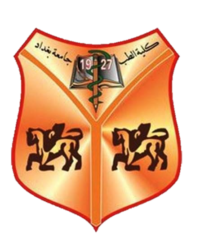Curriculum Description
This course description provides a necessary summary of the most important characteristics of the course and the expected learning outcomes for the student to achieve evidence of whether they made the most of the available learning opportunities. It must be linked to a description of the program.
General Description
- Name of Organization: Baghdad College of Medicine
- Department: Pediatrics Department
- Module Name: Pediatrics
- Course Pattern: Clinical Sessions and Seminars
- Semester and Year: 6th Year
- Total Course Hours: 70 Theoretical Hours, 58 Clinical Sessions Hours
Goal of the Course
- Deliver a comprehensive medical education to assure the predetermined standards for graduation in knowledge, skills, and behavior.
- Ensure that graduates are aware of the clinical challenges and best practices associated with caring for patients and promoting the health of the Iraq society.
Outcome of this Module
The fundamental purpose of medical education is to graduate safe competent lifelong learners and establish a foundation to continue their careers as expressed in these learning outcomes and interpret the results in problem-solving and decision-making.
A. Cognitive and Theoretical Goals:
- Application of biomedical scientific principles, methods, and knowledge of basic sciences as integrated disciplines in a system-based model serving the clinical practice.
B. Skills:
- Gaining adequate skills in taking patients' history from the mother or caregiver.
- Ability to do proper physical examination of the child including measurement of growth on centile charts.
Methods of Learning
- Clinical Sessions
- Theoretical Hours
Methods of Assessment
- Short essay and Single best answer written exam at mid-year and end of year
- Long case exam: History and Clinical examination at the end of clinical Course
- End of the course: Written exam and OSCE (Objective Structured Clinical Examination)
Values and Sentimental Goals
- The graduate must consistently demonstrate compassion, respect, integrity, and commitment to excellence in all professional and personal responsibilities.
General and Qualifying Skills
- Essential practical and procedural basic skills of daily doctor practice.
- Using appropriate communication techniques with patients, their families, colleagues, and all medical staff.
- Appropriate professional behavior and basic knowledge in the principles of medical ethics.
- Technical skills in retrieving, collecting, and interpreting computer-based information.
Infrastructure
| Topic | Outcomes | Method of Assessment | Teaching Method | Hours | Weeks |
|---|---|---|---|---|---|
| Well Baby Clinic | Mentioned | Written Exams | Lectures | 85 | 1-6 |
References
- Course Books Required: 1- Nelson-Essentials of Pediatrics, 2- Illustrated Pediatrics
- Main References (Sources): Nelson textbook of Pediatrics
Recommended Resources
- Electronic References
- Link to Electronic Reference 1
- Link to Electronic Reference 2
Course Development Plan
- Application of Integrated Curriculum

